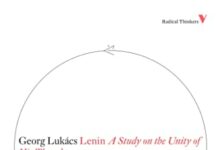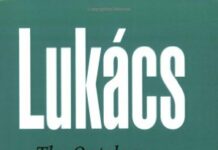
Ebook Info
- Published: 2020
- Number of pages: 408 pages
- Format: PDF
- File Size: 21.08 MB
- Authors: Georg Lukács
Description
This is the first time one of the most important of Lukács’ early theoretical writings, published in Germany in 1923, has been made available in English. The book consists of a series of essays treating, among other topics, the definition of orthodox Marxism, the question of legality and illegality, Rosa Luxemburg as a Marxist, the changing function of Historic Marxism, class consciousness, and the substantiation and consciousness of the Proletariat. Writing in 1968, on the occasion of the appearance of his collected works, Lukács evaluated the influence of this book as follows:”For the historical effect of History and Class Consciousness and also for the actuality of the present time one problem is of decisive importance: alienation, which is here treated for the first time since Marx as the central question of a revolutionary critique of capitalism, and whose historical as well as methodological origins are deeply rooted in Hegelian dialectic. It goes without saying that the problem was omnipresent. A few years after History and Class Consciousness was published, it was moved into the focus of philosophical discussion by Heidegger in his Being and Time, a place which it maintains to this day largely as a result of the position occupied by Sartre and his followers. The philologic question raised by L. Goldmann, who considered Heidegger’s work partly as a polemic reply to my (admittedly unnamed) work, need not be discussed here. It suffices today to say that the problem was in the air, particularly if we analyze its background in detail in order to clarify its effect, the mixture of Marxist and Existentialist thought processes, which prevailed especially in France immediately after the Second World War. In this connection priorities, influences, and so on are not particularly significant. What is important is that the alienation of man was recognized and appreciated as the central problem of the time in which we live, by bourgeois as well as proletarian, by politically rightist and leftist thinkers. Thus, History and Class Consciousness exerted a profound effect in the circles of the youthful intelligentsia.”
User’s Reviews
Editorial Reviews: Review George Lukacs’s History and Class Consciousness is a truly extraordinary work, and its English translation, after almost fifty years of neglect by English and American publishers, is a major event…The full quality of Lukacs’s brilliance is most powerfully manifested in this ‘youthful’ work (done when merely 38!), where he reveals himself as by far and away the most talented philosopher among 20th-century Marxists, and as their most penetrating critic of contemporary culture…he is a major stimulus in the development of what is certainly the most creative school of social theorists in the 20th century, and of whom Herbert Marcuse is only the best-known member. For all this, then, we owe homage to Georg Lukacs.—Alvin W. Gouldner , New York Times Book Review— From the Back Cover ‘George Lukacs’s History and Class Consciousness is a truly extraordinary work, and its English translation, after almost fifty years of neglect by English and American publishers, is a major event…The full quality of Lukacs’s brilliance is most powerfully manifested in this ‘youthful’ work (done when merely 38), where he reveals himself as by far and away the most talented philosopher among 20th-century Marxists, and as their most penetrating critic of contemporary culture.’ -Alvin W. Gouldner, New York Times Book Review. About the Author Georg Lukács was a Hungarian Marxist philosopher, aesthetician, literary historian, and critic.Rodney Livingstone, Reader in German at the University of Southampton, has edited and translated numerous works by Lukács, Theodor Adorno, and others. Read more
Reviews from Amazon users which were colected at the time this book was published on the website:
⭐This is most assuredly the greatest book of Marxists philosophy, since the death of Marx. It’s a real philosophical, moral, and political tragedy, that Lukacs was essentially rebuked and quarantined by the communist state he was defending. I’ve heard before that Lukacs was a Stalinist, but clearly the people spouting this claptrap have not read his essay on Reification. Long before the Economic and Philosophic Manuscripts were published, Lukacs was able to read in Marx’s theory of the commodity fetish, nearly his entire theory of alienation, and reorient Marxism in a humanist direction. This is no small feat, as the commodity fetish is a very small subsection, maybe 5-10 pages, in a 900 page book. For those critics, like Althusser, who claim Marx jettisoned his theory of alienation, and humanism, in Capital, one wonders how Lukacs found it in capital, when it’s never made explicit. I wager it’s because Lukacs really is a genius, and a great philosophic mind, who went unappreciated, and remains unappreciated. Had the soviets, and communists, of his era, taken his philosophy more seriously, there’s a chance these states would not have become such abject dungeons. And for the dungeon masters, we can quickly see why Lukacs had to be cast aside.Now there are some sections of this book that went right over my head. When Lukacs begins to wrestle with Kant, and all the subsequent German Idealists, I was lost. His arguments seem valid, but I’m in no learned position to weigh on this definitively. Nonetheless, his essays on dialectics, Rosa Luxemburg, the law, and class consciousness, are definitely positive contributions to philosophy. If Marx has spent all his time writing philosophy, instead of mastering Political Economy, I’m fairly certain this would be the book he would have written. Of course Marx would have also rebuked anyone for spending all their time writing Philosophy, but Lukacs gets a pass for having actually participated in his local Hungarian revolution. Much to the chagrin of his past sociological colleagues, he jettisoned his old schools of thought: Hegelianism, Durkheim’s work, Weber, etc. and become a convicted Marxists from the revolution, until his death.There’s undoubtedly a religious element to Lukacs Marxism, in the entire book I saw him disagree with Marx once. Okay fine, he didn’t actually disagree, he just said Marx should have elaborated a certain point more. But really, this is the type of propagandizing, and certainty we ought to be pushing in the school system, and demanding of all citizens (am I joking?). There’s nothing wrong with the impeccable logic of: Marx said it, therefore it’s true. In an era of religious Marxist fervor (i.e., right after the Bolshevik revolution), Lukacs may not be the MOST religious Marxists in the room (or maybe he is…), but he is certainly giving the best sermon, and offering the best philosophy.He wrote one more book, that defends this book, from more determinist and Stalanistic critics. This book was recently found in Stalin’s actual archives (I believe), and is now published. After grappling with Kant, I intend to re-read Lukacs theory of reification and weigh in on his critiques of Kant, and then perhaps read his subsequent book defending this one.
⭐This is probably the most important work for Marxism outside of Marx’s own writings. The most illuminating section comes within the famous Reification essay in which Lukacs draws out the implications of the commodity fetish in an orthodox way that deserves more attention than it gets.
⭐I haven’t read all of the book, but the parts that I have, have proved very useful. Great to read his theories.
⭐Excellent, focussed, Marxist volume–many of its theses persisting in relevance. Recommended.
⭐*History and Class Consciousness* is one of those books that are re-discovered again and again. Published in Germany in the ’20s and eagerly read by those who formed the first wave of “Critical Theory”, Lukacs’ blend of Hegel and Marx became influential again in the explosion that was 1968: “New Leftists” looking to productively critique both capitalist society and official socialist sachems took up his ideas. This is slightly ironic, because Lukacs’ own public position of deference to the shibboleths of “actually existing socialism” caused Thomas Mann to caricature him as the Jesuit Naptha in *The Magic Mountain*. However, the former idealist had not a little bit of independence in him, and the essays collected here still provide much of value to those looking to rigorize their activism a little; even if “intersectionality” is your bag I always thought I could detect a Lukacsean strain in Albert Murray’s *The Omni-Americans*, one of the notable early Black Studies books.The longest and most famous piece in the book is “Reification and the Consciousness of the Proletariat”, a triptych that expands Marx’s concept of “commodity fetishism” to critique the most rarefied concepts of classical bourgeois philosophy, and asserts following Hegel (and Schelling) that the developing proletariat is the “subject-object of history”, their class consciousness being the first truly accurate representation of social realities and human values. If you have not already read Marx and the German Idealists, this is a bad place to start thinking about such things: the writings of the Frankfurt School, forbidding as they are reputed to be themselves, lock into the massified culture we all possess now and make grasping the basic ideas of ‘sophisticated Marxism’ easier. However, anyone who claims to be a social scientist and cannot accept the high standard and majestic sweep of Lukacs’ argumentation here is a charlatan.The other essays are more occasional pieces, published in Communist intellectual journals before the movement congealed around Stalin’s murderous whims: and as for their independence of mind, this Lukacs was upbraided by no less than Lenin himself for being an “infantile leftist”. The essay on Rosa Luxemburg and “What is Orthodox Marxism?” are especially worthwhile; unfortunately, in the closing essay on organization we see an endorsement of the ‘quality-control’ purges that would soon turn into mass executions, a reminder that we must not trust our political desires to unimpeachable authorities no matter how odious the mainstream society becomes.If you count yourself a “radical”, and for some reason, you will be highly edified.
⭐The basic willingness to examine Rosa Luxemburg’s major work The Accumulation of Capital early in this book and her “Critique of the Russian Revolution” over 200 pages later in documents written in the years 1918 to 1930 to provide a history of times for cycles of social hysteria about who means what in shifting schemes for very European intellectual baby Babylons acting like Gog and Magog lining up for too many halves of the apocalypse producing the incoming undertow of where do we go from dimorphism mobs of guys ganging up on girls to render people powerless to the marginal thinking of unspeakable magic money paper, plastic, or raising the debt ceiling within a hundred years of my lifetime and now, it was somehow surprising to find revolution as a scientific term for work of scholars which I quote:The attitude that inspires monographsis the best way to place a screen beforethe problem the very sight of which strikesterror into the heart of a Social-Democraticmovement turned opportunist. (p. 30).Marginal thinking is considered individualist for the usual history of capitalism. Only by looking at the totality as an arbitrary stupidity does an unusual intellect become otherwise.
⭐Decent quality- book is an important read but is a skewed POV
⭐impeccable
⭐階級意識という言葉がなぜその時点で意味を持ったのかというと、「ぶっちゃけ、結局、生まれで決まっちゃうよね」的な主張が「言葉と物」のような本(それを書いた人物は間違っても哲学者ではない)のトーンにあったからでした。
⭐
Keywords
Free Download History and Class Consciousness: Studies in Marxist Dialectics in PDF format
History and Class Consciousness: Studies in Marxist Dialectics PDF Free Download
Download History and Class Consciousness: Studies in Marxist Dialectics 2020 PDF Free
History and Class Consciousness: Studies in Marxist Dialectics 2020 PDF Free Download
Download History and Class Consciousness: Studies in Marxist Dialectics PDF
Free Download Ebook History and Class Consciousness: Studies in Marxist Dialectics





